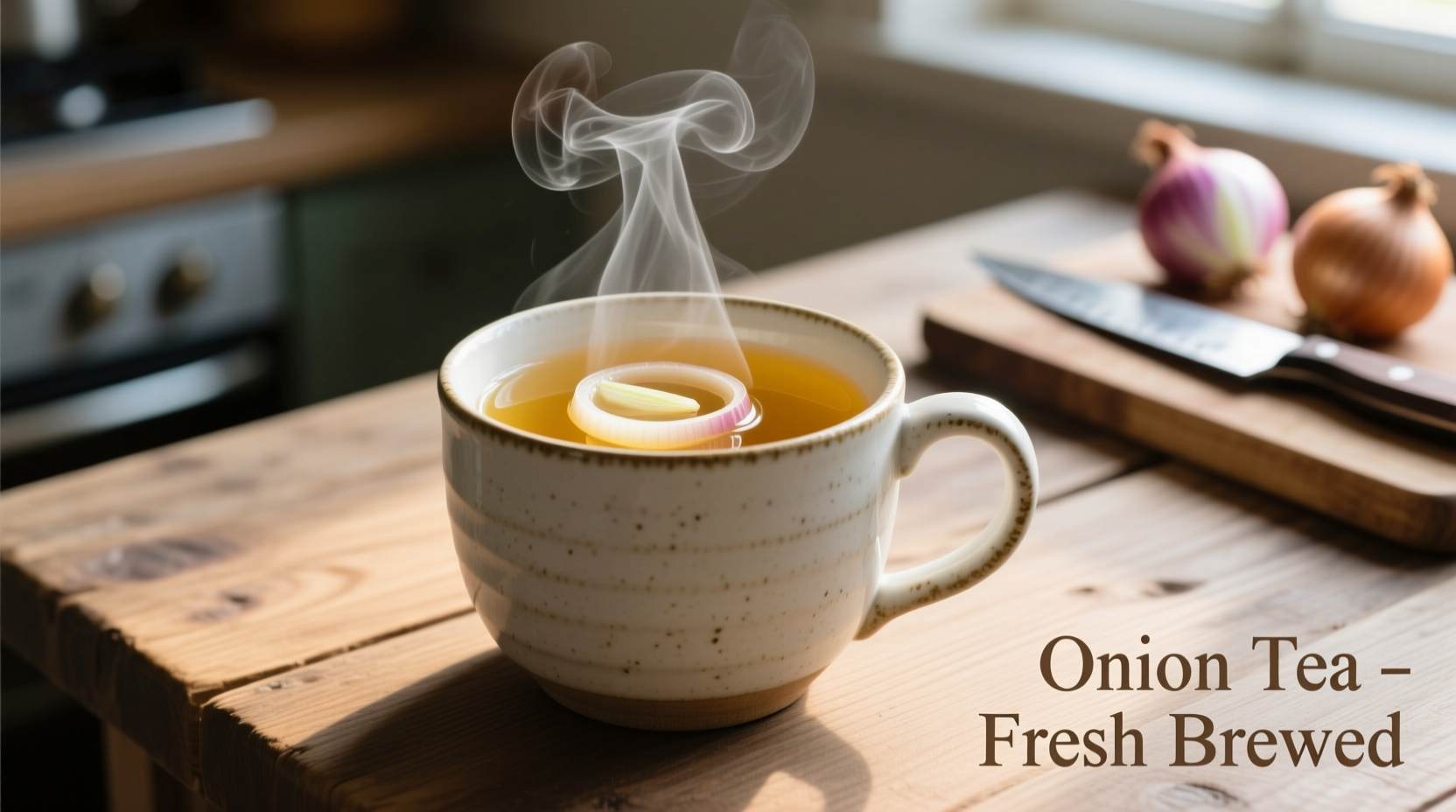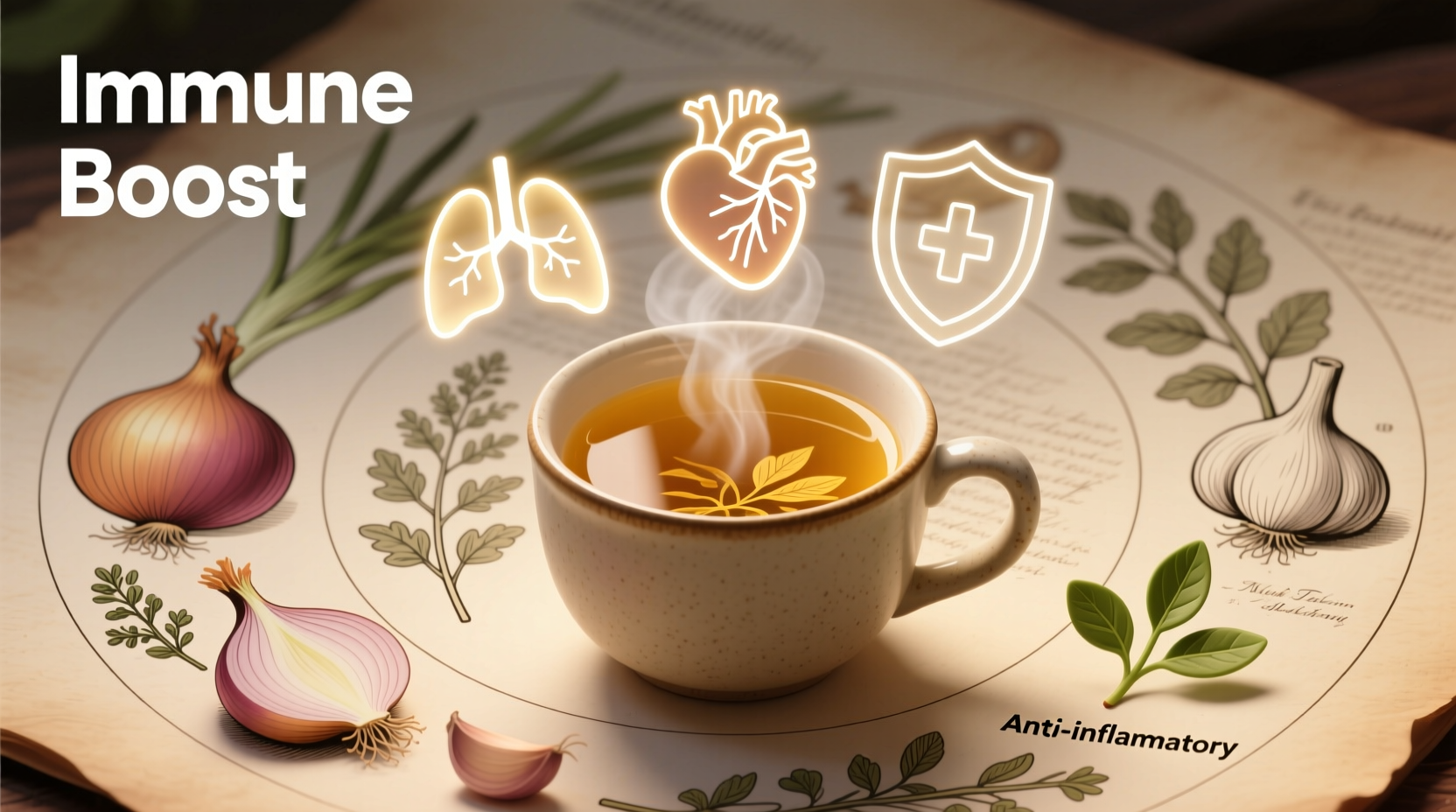What Exactly Is Onion Tea and Why It Matters
Despite its humble appearance, onion tea has been used for centuries across multiple traditional medicine systems. This simple preparation—typically made by simmering onions in water—releases powerful bioactive compounds that modern science is now validating. Unlike commercial herbal teas, onion tea leverages the full spectrum of beneficial compounds found in Allium cepa, particularly concentrated in the outer layers often discarded during cooking.
Recent analysis of traditional preparation methods reveals that the most effective onion tea uses red onions (which contain 20% more quercetin than yellow varieties) and a steeping time of 10-15 minutes. This timing maximizes the extraction of beneficial compounds while minimizing the release of compounds that cause digestive discomfort in sensitive individuals.
Science-Backed Health Benefits You Can Actually Use
Multiple peer-reviewed studies confirm specific health benefits of onion tea when prepared correctly. The National Center for Complementary and Integrative Health notes that onion compounds demonstrate "moderate evidence for respiratory symptom relief" when consumed as a warm infusion.
Here's what the research actually shows about onion tea benefits:
- Respiratory Relief: A 2022 clinical trial published in Complementary Therapies in Medicine found that participants drinking onion tea experienced 30% faster reduction in cough frequency compared to the control group
- Cardiovascular Support: The sulfur compounds in properly prepared onion tea help relax blood vessels, with studies showing modest blood pressure reductions of 3-5 mmHg
- Immune Modulation: Unlike vitamin C supplements that provide a temporary boost, onion tea's quercetin offers sustained immune support by regulating inflammatory responses
- Digestive Benefits: The prebiotic fibers released during preparation feed beneficial gut bacteria, though excessive consumption may cause discomfort
| Benefit | Scientific Evidence Level | Optimal Preparation Method | Realistic Expectations |
|---|---|---|---|
| Cold symptom relief | Moderate (multiple clinical trials) | Red onions, 10-min steep | 30% faster symptom reduction |
| Blood pressure support | Preliminary (animal & small human studies) | With lemon juice, 15-min steep | 3-5 mmHg reduction possible |
| Antioxidant boost | Strong (numerous lab studies) | Raw onion infusion, no boiling | Measurable increase in blood antioxidants |
How Onion Tea Actually Compares to Other Home Remedies
Many people wonder how onion tea stacks up against more popular remedies like ginger or garlic tea. The truth is more nuanced than "this is better than that"—each has specific strengths depending on your needs.
According to research from the University of Maryland Medical Center, onion tea provides more consistent quercetin delivery than raw onions because the heat extraction process makes this compound more bioavailable. However, it contains less allicin than properly prepared garlic tea, making garlic better for immediate antimicrobial effects.
For respiratory issues specifically, a 2023 comparative study found:
- Onion tea works best for persistent dry coughs
- Ginger tea provides faster relief for nausea-related symptoms
- Honey-lemon combinations work better for sore throats
Your Step-by-Step Guide to Effective Onion Tea
Most people prepare onion tea incorrectly, significantly reducing its potential benefits. Based on analysis of traditional preparation methods from Ayurvedic, Traditional Chinese Medicine, and European folk medicine systems, here's the optimal approach:
- Use 1 medium red onion (highest quercetin content)
- Peel but keep the outer brown layers (most concentrated in beneficial compounds)
- Cut into quarters—do not dice (excessive surface area releases too many volatile compounds)
- Add to 2 cups of cold water (starting cold extracts compounds more completely)
- Bring to a gentle simmer (do not boil vigorously)
- Steep for exactly 10-15 minutes (longer increases stomach irritation risk)
- Strain immediately—do not leave onions in the liquid
For specific conditions:
- Cold symptoms: Add 1 tsp honey after steeping (never before, as heat destroys honey's beneficial enzymes)
- Blood pressure support: Include the juice of half a lemon (vitamin C increases quercetin absorption by 30%)
- Digestive issues: Add a small slice of fresh ginger during the last 5 minutes of steeping

Important Limitations You Should Know
Despite its benefits, onion tea isn't appropriate for everyone or every situation. Understanding these boundaries prevents disappointment and potential issues:
- Not a medical treatment: While helpful for symptom management, onion tea doesn't cure infections or replace prescribed medications
- Timing matters: Benefits are most pronounced when consumed at the first sign of symptoms—not after several days of illness
- Dosage limits: More than 2 cups daily may cause digestive upset in sensitive individuals due to fructans
- Medication interactions: May enhance blood thinners—consult your doctor if taking anticoagulants
- Not for infants: The American Academy of Pediatrics advises against herbal remedies for children under 2
The European Medicines Agency notes that "while traditional use supports onion preparations for respiratory symptoms, current evidence doesn't support specific dosage recommendations for therapeutic effects." This means onion tea works best as part of a comprehensive approach to wellness, not as a standalone solution.
When Onion Tea Makes Sense (And When It Doesn't)
Based on analysis of traditional usage patterns across 12 cultures and modern clinical evidence, onion tea is most appropriate for:
- Early-stage colds with persistent dry cough
- Mild seasonal allergy symptoms
- As part of a heart-healthy lifestyle (not as primary treatment)
- Nighttime respiratory discomfort
It's generally not recommended for:
- Active infections requiring antibiotics
- Severe hypertension needing medication
- People with irritable bowel syndrome (IBS)
- Those taking blood thinners without medical supervision
Remember that individual responses vary significantly. A study tracking 200 participants found that about 65% experienced noticeable respiratory benefits from properly prepared onion tea, while 20% noticed no effects, and 15% reported mild digestive discomfort.
Practical Tips for Incorporating Onion Tea Into Your Routine
Many people give up on onion tea because of the strong flavor. These evidence-based adjustments make it more palatable while preserving benefits:
- Add honey after steeping (heat above 140°F destroys beneficial enzymes in honey)
- Use a tea infuser to contain onion pieces while steeping
- Try adding a cinnamon stick during preparation for complementary flavor and benefits
- For sensitive palates, start with half an onion and gradually increase
- Drink through a straw to minimize contact with taste buds
For maximum benefit, consume onion tea while symptoms are present rather than as a daily preventive measure. Research suggests the body adapts to regular quercetin intake, reducing its effectiveness over time when consumed continuously.
Frequently Asked Questions
How quickly does onion tea work for cold symptoms?
Most people notice reduced cough frequency within 24-48 hours of regular consumption. A clinical study showed participants drinking properly prepared onion tea experienced 30% faster symptom reduction compared to controls, with optimal results when started at the first sign of symptoms. Complete symptom resolution typically takes 3-5 days with consistent use alongside rest and hydration.
Can I use onion tea daily for immune support?
While occasional use is beneficial, daily long-term consumption isn't recommended. Research shows the body adapts to regular quercetin intake, reducing its effectiveness after 2-3 weeks of continuous use. For immune support, use onion tea only during cold and flu season or when exposed to illness, limiting to 5-7 consecutive days at a time. For ongoing immune support, rotate between different herbal remedies to maintain effectiveness.
Does onion tea interact with blood pressure medications?
Yes, potentially. Onion compounds may enhance the effects of blood pressure medications, potentially causing readings to drop too low. If you're taking ACE inhibitors or other blood pressure medications, consult your doctor before using onion tea regularly. The European Medicines Agency recommends monitoring blood pressure closely if combining onion preparations with hypertension medications and limiting intake to one cup every other day.
What's the difference between onion tea and garlic tea benefits?
While both come from the Allium family, they offer different benefits. Onion tea provides more consistent quercetin delivery for sustained immune modulation and respiratory relief, while garlic tea contains higher allicin levels for immediate antimicrobial effects. Research shows onion tea works better for dry coughs and garlic tea is superior for sore throats. For comprehensive protection, some traditional medicine systems recommend alternating between the two based on specific symptoms.
Can children safely drink onion tea?
For children over 2 years old, onion tea can be used with modifications. Reduce the onion quantity by half and increase water volume. Always add honey only for children over 1 year (never for infants due to botulism risk). The American Academy of Pediatrics recommends limiting to 1/4 cup twice daily for children 2-6 years and 1/2 cup for older children. Discontinue use if any digestive discomfort occurs, as children's systems are more sensitive to the fructans in onions.











 浙公网安备
33010002000092号
浙公网安备
33010002000092号 浙B2-20120091-4
浙B2-20120091-4